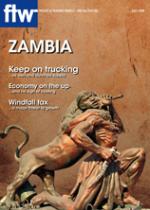IF YOU own a truck, head up to Zambia. If you don’t
own a truck, buy one and head up to Zambia.
Last year FTW reported that the Zambian
economy was booming, this year the word most
bandied around is “exploding”.
As the world demand for copper continues
to increase, so does the price of copper, with the
result that more and more is being invested by
international mining houses into
Zambia’s Copperbelt.
Existing mines have increased production and new
mines have started producing with the result that the
demand for roadfreight transport for the export of
copper and, to a lesser extent, the import of mining
and related equipment, is quickly outstripping
the supply.
The ideal would be to transport the copper
concentrate and cathodes by rail but virtually all
parties are in agreement that the rail infrastructure
across Southern and Central Africa does not currently
lend itself to the productive utilisation of this mode.
Even Transnet is being criticised for being unable to
provide reliable delivery times for cargo to and from
the Zambian border.
Of concern is the fuel price which continues to
increase unabated. Zambia reportedly has the most
expensive fuel in the region at R18.06 per litre of
diesel and R20.91 per litre of unleaded premium
petrol as of 1 July 2008. Jet fuel increased by a
whopping 50% at the beginning of July, making
airfreight a luxury practically no-one can afford
and seriously hampering the export of perishables.
Although the increase in the fuel price is a global
phenomenon, locally the situation is exacerbated by
Zambia’s landlocked status and the recent closure of
its only refinery situated in the Copperbelt region.
The local currency, the kwacha, is also
strengthening and while all revenue is in US dollars,
all costs have to be paid in kwacha which makes it
an extremely expensive country in which to live and
conduct business. Over the past year the kwacha has
gained 25%, from approximately 4 000 to the US$ to
3 200 as at July 1.
From a regional perspective, the problems in
Zimbabwe have strengthened the Zambian economy
as investors in Central Africa prefer the safer and
more politically stable environment where the threat
of nationalisation doesn’t continually hang over them.
On the agricultural front, many ex-Zimbabwean
tobacco farmers came to Zambia to start afresh but
they were dealt a double-whammy with the kwacha
gaining in strength and inflation falling from 15% to
11%. Established farmers who did not require major
capital investment to start up are not as affected,
but the agricultural sector will most likely not expand
until the kwacha weakens again.
Demand outstrips supply as economy ‘explodes’
31 Jul 2008 - by Staff reporter
0 Comments
Zambia 2008

31 Jul 2008
31 Jul 2008
31 Jul 2008
31 Jul 2008
31 Jul 2008
31 Jul 2008
